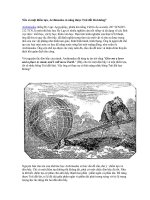16152 archimedes eureka
Bạn đang xem bản rút gọn của tài liệu. Xem và tải ngay bản đầy đủ của tài liệu tại đây (202.09 KB, 2 trang )
ARCHIMEDES and EUREKA
Why do ships float on water when in fact they should sink?
Why does paper float on water and a paperweight sink?
Archimedes, the Greek inventor and mathematician,
accidentally discovered 2200 years ago the answer to these
questions.
People believe that King Heiro II (a friend of Archimedes)
ordered a new crown of solid gold. For whatever reason, the
king began to suspect the goldsmith forged the crown of
adding silver to cut costs. The king asked Archimedes for help.
Archimedes went for one last thinking to see if he could resolve
the problem once and for all. He went to the Syracuse public bath
house (which were common in ancient times) with the problem in
his head while was having a bath. Archimedes filled the tub with
water, and let his naked body slowly into water. He noticed water
was spilling over the sides. In a flash, Archimedes realised the
relation between the water that fell out and the weight of his body
- in other words he discovered why some objects float and some
sink! Archimedes was so excited with his discovery that he
hopped out of the bath, and rushed naked into the street while he
was yelling 'Eureka!' 'Eureka!' (Greek word for 'I have found it!).
Archimedes returned to his place, filled a bowl with
water and placed it in a larger bowl. Then he gently let
down the crown, and as expected, some water spilled out.
Archimedes quickly measured the volume of displaced
(=odmaknjena) water and calculated the density. When
compared to the known density of an equal amount of
gold, he noticed that the crown was less dense than the
gold. This led him to believe that the goldsmith cheated
the king.
Archimedes discovery, now popular as the Archimedes' principle, explains why steel ships,
weighing thousands of tons, float. But what is Archimedes' principle? When a body is
immersed in water, it experiences a force (the buoyancy force). This force is equal to the
weight of the water displaced by the body.
For instance, a lump of steel will sink for it is unable to displace water that equals its weight.
But steel of the same weight but shaped as a bowl, will float. This is because the weight
distributes over a larger area and the steel displaces water equal to its weight. So a heavily
laden (=natovorjena) ship floats because its total weight is exactly equal to the weight of the
water it displaces.
ARCHIMEDES and EUREKA
Why _____ ships ______ (float) on water when in fact they
should sink? Why _____ paper _______ (float) on water and a
paperweight sink? Archimedes, the Greek inventor and
mathematician, accidentally ___________ (discover) 2200
years ago the answer to these questions.
People believe that King Heiro II (a friend of Archimedes)
___________ (order) a new crown of solid gold. For whatever
reason, the king ________ (begin) to suspect the goldsmith
_________ (forge) the crown of adding silver. The king
________ (ask) Archimedes for help.
Archimedes _______ (go) for one last thinking to see if he _______
(can) resolve the problem once and for all. He _______ (go) to the
Syracuse public bath house (which were common in ancient times)
with the problem in his head while ___________ (have) a bath.
Archimedes ________ (fill) the tub with water, and _______ (let)
his naked body slowly into water. He ________ (notice) water
__________ (spill) over the sides. In a flash, Archimedes
________ (realise) the relation between the water that __________
(fall out) and the weight of his body - in other words he __________
(discover) why some objects ________ (float) and some ________
(sink)! Archimedes _______ (be) so excited with his discovery that
he _________ (hop) out of the bath, and __________ (rush) naked
into the street while he ____________ (yell) 'Eureka!' 'Eureka!'
(Greek: for 'I have found it!).
Archimedes __________ (return) to his place,
_________ (fill) a bowl with water and ___________
(place) it in a larger bowl. Then he gently _______ (let)
down the crown, and as ____________ (expect), some
water ____________ (spill out). Archimedes quickly
____________ (measure) the volume of displaced
(=odmaknjena) water and __________ (calculate) the
density. When _________ (compare) to the known
density of an equal amount of gold, he _________
(notice) that the crown _______ (be) less dense than
the gold. This _______ (lead) him to believe that the
goldsmith __________ (cheat) the king.
Archimedes discovery, now popular as the Archimedes' principle, _________ (explain) why
steel ships, weighing thousands of tons, ________ (float). But what ______ (be)
Archimedes' principle? When a body ______ (be) immersed in water, it ___________
(experience) a force (the buoyancy force). This force ______ (be) equal to the weight of the
water displaced by the body.
For instance, a lump of steel will sink for it _____ (be) unable to displace water that _______
(equal) its weight. But steel of the same weight but shaped as a bowl, will float. This ______
(be) because the weight __________ (distribute) over a larger area and the steel
__________ (displace) water equal to its weight. So a heavily laden (=natovorjena) ship
_________ (float) because its total weight is exactly equal to the weight of the water it
displaces.









